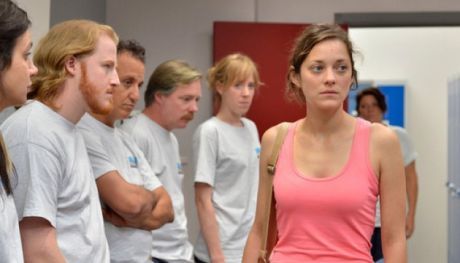Arts
You are here
Austerity and the process of struggle

May 16, 2015
After a woman returns from a medical leave of absence for depression, she discovers that her boss put her fate to a vote: rather than welcome her back her co-workers voted to each receive a 1000 Euro bonus. Having won a recount, she now has the rest of the weekend—two days and one night—to convince her co-workers to forfeit their bonus so she can have her job back.
This is the plot of Two Days, One Night, the excellent 2014 film by the Dardennes brothers, which won an Oscar nomination for Marion Cotillard. The writers/producers/director duo have made a number of films about working class life in Belgium—including on immigration, unemployment and anti-fascist resistance.
In their latest film they show the impact of austerity on a small community, and the process of struggle of one woman trying to win her job back. Filmed like a documentary in a simple style, the viewer feels right next to the main character in her struggle.
Though focused on one person the themes of the film are universal: the capitalist drive to exploitation, squeezing profits out of workers and firing them when they’re no longer needed; the way in which bosses pit workers against each other, which disproportionatly affects oppressed groups like women, racialized groups and disabled people; and the faulty choices of austerity that demand one section or another of the 99% make sacrifices without ever questioning the profits of the 1%.
The fact that this happens at a workplace making solar panels is a reminder that while changing what society produces is necessary to solve the climate crisis, this has to be combined with changing how production is organized and who controls it.
The process of struggle
In a typical Hollywood film there would be one evil enemy and one born hero who in one rousing speech rallies everyone to victory, solving all the world’s problems. Not so in this film.
Instead it shows the process of struggle, both internal and collective. Cotillard has just returned from stress leave and being told her coworkers voted against her, and needs encouragement from family and friends to fight. She battles her own self-doubts and needs to build her confidence over time, with peaks and troughs.
Through this process she discovers the old analogy (made by the revolutionary Leon Trotsky): every workplace has one reactionary worker who will always scab on their coworkers and can never be won over, one progressive willing to fight from the start, and three in the middle who can be won to either side. Cotillard's character finds immediate support from a few coworkers, violent hostility from one, and a large number in the middle. She has to win the argument for solidarity over narrow self-interest, a process that not only develops her own self-confidence and experience but also changes others in unexpected ways.
At the end the lesson is not one of immediate victory or loss, but of the individual and collective process of struggle.
Section:









